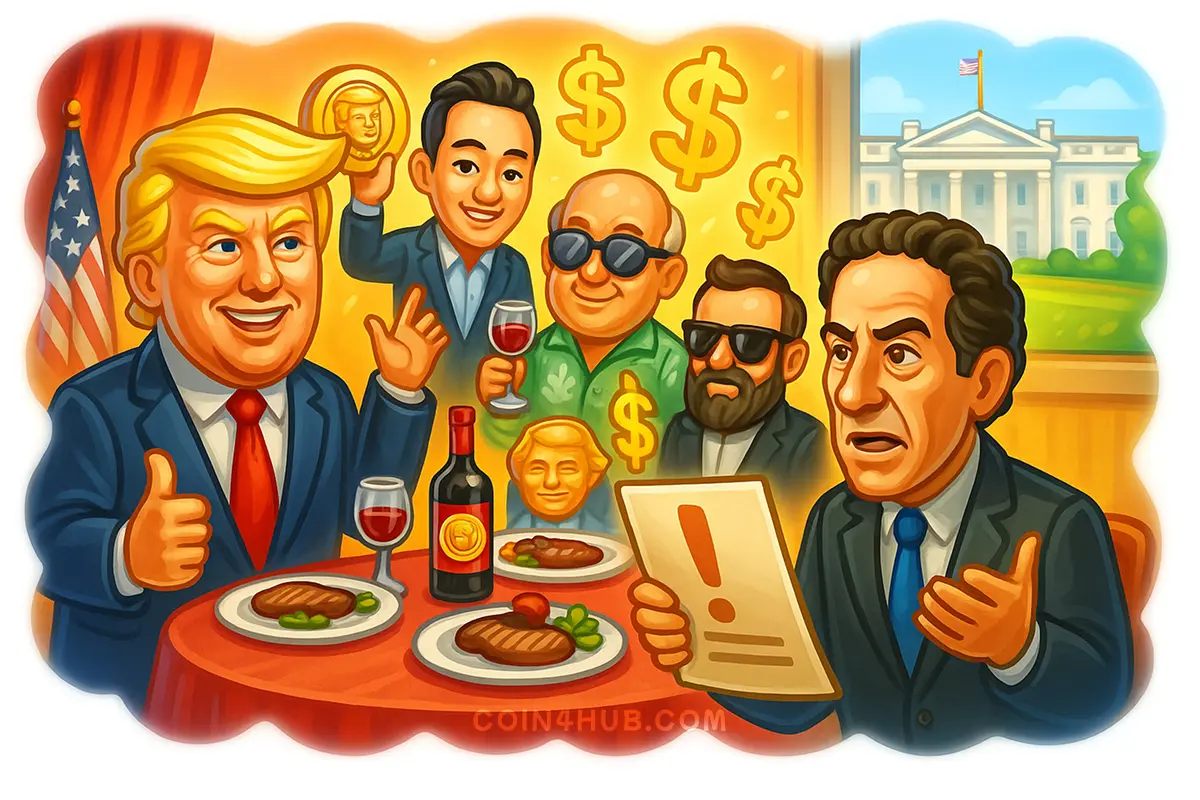Table of Contents
The cross-hairs of cryptocurrency and politics have never been so near as the U.S. House Judiciary Committee’s ranking member, Jamie Raskin, notches up investigations involving memecoin investor dinner held by President Donald Trump. And the splashy meeting has touched off heated discussion about presidential ethics, foreign influence and the shifting terrain of digital assets in American politics.
The Controversy Unfolds: What We Know About Trump’s Crypto Dinner
Rep. Jamie Raskin, a perennial adversary of the Trump administration, is one of the latest Democrat lawmakers to call for answers over why the president dined with big investors in his memecoin project. The event, that drew a crowd of cryptocurrency enthusiasts and deep-pocketed backers large and small, has become a lightning rod for potential foreign corruption and influence-peddling.
Among the crowd, the dinner is not simply a dinner – it stands for a new phenomenon where presidential reach is expanding into cryptocurrency worlds in ways that have no precedent. Unlike the typical fundraising event, which would cater to a broader class of donors, this meeting specially honored investors who had contributed significant sums to Trump’s digital asset projects, raising a number of longstanding questions around the lines between access and influence, personal business and presidential responsibilities.
Key Concerns Raised by Democratic Leadership
Raskin’s formal inquiry centers on several critical issues that have emerged from this controversial event:
- Attendee transparency: The complete list of dinner participants remains undisclosed
- Foreign investment sources: Questions about potential international funding sources
- Access and influence: Whether financial investment translates to political access
- Constitutional compliance: Potential violations of emoluments clauses
- Financial legitimacy: Verification of funding sources and legal compliance
Understanding the Political Ramifications
The timing of Raskin’s inquiry reflects broader Democratic concerns about the normalization of cryptocurrency in presidential politics. As the ranking member of the House Judiciary Committee, Raskin carries significant weight in congressional oversight, though his minority party status limits immediate enforcement capabilities.
This situation highlights a fundamental shift in how modern presidents interact with emerging financial technologies. Previous administrations maintained strict separation between personal business interests and official duties, but the Trump administration’s approach to cryptocurrency ventures has challenged traditional ethical boundaries.
The Role of Justin Sun and International Investors
Particularly troubling to Democratic lawmakers is the presence of Tron founder Justin Sun at the dinner. Sun, a prominent Chinese-born cryptocurrency entrepreneur, represents the type of foreign investor that raises constitutional red flags regarding presidential emoluments.
Sun’s participation exemplifies the complex international nature of cryptocurrency investments. His early involvement in Trump’s family crypto operations creates a web of financial relationships that Democrats argue requires thorough investigation and transparency.
| Concern Category | Specific Issues | Constitutional Implications |
|---|---|---|
| Foreign Investment | Justin Sun’s participation | Potential emoluments clause violations |
| Access to President | Pay-for-access allegations | Corruption and ethics violations |
| Financial Transparency | Undisclosed funding sources | Campaign finance law compliance |
| Congressional Oversight | Limited minority party power | Checks and balances erosion |
Broader Democratic Opposition Strategy
Raskin’s letter represents part of a coordinated Democratic response involving multiple senators and representatives. Senators Elizabeth Warren, Chris Murphy, and Richard Blumenthal have joined the effort, creating a unified front demanding accountability and transparency.
This multi-chamber approach demonstrates the seriousness with which Democrats view the potential constitutional and ethical implications of the memecoin dinner. By involving both House and Senate leadership, the opposition aims to maintain sustained pressure despite their minority status.
The Challenge of Minority Party Oversight
One of the most significant obstacles facing Democratic lawmakers is their minority status in both chambers of Congress. This political reality means that formal investigations or subpoenas require Republican cooperation, which seems unlikely given current partisan dynamics.
However, Democrats are leveraging public pressure and media attention to force transparency. Their strategy focuses on raising awareness about potential constitutional violations and building public support for accountability measures.
Constitutional and Legal Implications
The memecoin dinner raises several serious constitutional questions that extend beyond partisan politics. The emoluments clauses of the Constitution specifically prohibit presidents from accepting gifts or payments from foreign governments or entities without congressional approval.
Legal experts have debated whether cryptocurrency investments from foreign nationals constitute emoluments, particularly when those investments provide direct financial benefit to the president’s personal ventures. The novel nature of digital assets creates legal gray areas that require careful examination.
Precedent and Presidential Ethics
Historically, presidents have placed their business interests in blind trusts or divested entirely to avoid conflicts of interest. The Trump administration’s approach to maintaining business operations while in office has consistently challenged these traditional practices.
The cryptocurrency dinner represents an evolution of these concerns, introducing new complexities around digital assets and international investors. Unlike traditional real estate or business ventures, cryptocurrency operates across borders with limited regulatory oversight, making transparency and accountability more challenging.
The Cryptocurrency Industry’s Political Evolution
Trump’s memecoin venture reflects the broader evolution of cryptocurrency from a niche technology to a mainstream political and economic force. The industry’s growth has attracted increasing political attention, with both parties recognizing its potential impact on future elections and policy.
This political mainstreaming of cryptocurrency creates new challenges for traditional oversight mechanisms. Existing ethics rules and constitutional provisions were written long before digital assets existed, creating regulatory gaps that politicians and oversight bodies must navigate.
Future Implications for Presidential Politics
The precedent set by Trump’s cryptocurrency ventures could influence future presidential campaigns and administrations. If successful and unchallenged, similar ventures might become commonplace, fundamentally altering the relationship between presidential politics and personal financial interests.
Democratic concerns extend beyond immediate ethical violations to the long-term implications for democratic institutions. They argue that allowing unrestricted cryptocurrency ventures while in office could create new avenues for corruption and foreign influence.
Public Response and Media Coverage
The controversy has generated significant media attention and public debate about the appropriate boundaries of presidential business activities. Cryptocurrency enthusiasts argue that innovation requires political support and engagement, while critics worry about the precedent being set.
Social media platforms have become battlegrounds for this debate, with supporters defending the president’s right to engage in legitimate business while critics raise corruption concerns. This public discourse reflects broader American divisions about cryptocurrency regulation and presidential accountability.
Impact on Cryptocurrency Markets
The political controversy has created uncertainty in cryptocurrency markets, with investors questioning the long-term viability of politically connected digital assets. Market volatility often increases when regulatory or legal challenges emerge around high-profile cryptocurrency projects.
Some industry observers worry that excessive political involvement could lead to increased regulation or backlash against the entire cryptocurrency sector. Others argue that mainstream political adoption validates the industry’s legitimacy and potential.
Looking Ahead: Potential Outcomes and Scenarios
Several scenarios could emerge from the current controversy, each with different implications for presidential accountability and cryptocurrency regulation:
- Voluntary disclosure: The administration could voluntarily release attendee information
- Legal challenges: Courts might be asked to rule on constitutional issues
- Congressional investigations: Future Democratic majorities could launch formal investigations
- Regulatory responses: New rules governing presidential cryptocurrency ventures
- Electoral consequences: Public opinion could influence future elections
The Role of Upcoming Elections
Raskin’s acknowledgment that minority party status limits immediate action highlights the importance of upcoming elections. Democratic gains in either chamber could dramatically alter the oversight landscape and enable formal investigations.
This electoral dynamic adds urgency to Democratic efforts to maintain public attention on the issue. By keeping the controversy in the headlines, they hope to influence voter perceptions and build momentum for future accountability measures.
Key Takeaways and Implications
The controversy surrounding Trump’s memecoin dinner represents a watershed moment in American politics, highlighting the complex intersection of cryptocurrency, presidential ethics, and constitutional law. As digital assets become increasingly mainstream, the need for clear ethical guidelines and oversight mechanisms becomes more pressing.
Democratic demands for transparency, led by figures like Jamie Raskin, reflect broader concerns about maintaining democratic institutions and constitutional principles in an era of rapid technological change. Whether these efforts succeed may depend largely on electoral outcomes and public pressure.
The ultimate resolution of this controversy could establish important precedents for future presidential administrations and their engagement with emerging financial technologies. As cryptocurrency continues to evolve, so too must the frameworks for ensuring ethical governance and accountability.
For crypto enthusiasts and political observers alike, this situation represents a crucial test of how American democracy adapts to technological innovation while maintaining core principles of transparency and accountability. The outcome will likely influence both cryptocurrency regulation and presidential ethics for years to come.
Stay informed about the latest developments in cryptocurrency and politics at Coin4hub, where we provide comprehensive coverage of the digital asset landscape.
Frequently Asked Questions
What is Trump’s memecoin and why is it controversial?
Trump’s memecoin is a cryptocurrency venture associated with the former president’s business interests. The controversy stems from concerns about foreign investment, presidential ethics, and potential constitutional violations when sitting presidents engage in such ventures while in office.
Why is Jamie Raskin specifically concerned about this dinner?
As ranking Democrat on the House Judiciary Committee, Raskin is concerned about potential emoluments clause violations, foreign influence, and the lack of transparency around attendees and funding sources. He specifically highlighted the presence of foreign investors like Justin Sun.
What can Democrats actually do about this situation?
Currently limited by minority party status, Democrats can demand information, raise public awareness, and prepare for potential future investigations if they regain congressional majorities. They cannot force immediate action without Republican cooperation.
How might this affect cryptocurrency regulation?
The controversy could lead to new regulations governing presidential involvement in cryptocurrency ventures, clearer ethics guidelines for digital assets, and increased scrutiny of politically connected crypto projects.
What are the constitutional issues involved?
The main constitutional concerns involve the emoluments clauses, which prohibit presidents from accepting gifts or payments from foreign entities without congressional approval. Questions arise about whether cryptocurrency investments constitute such prohibited payments.
Source: CoinDesk


Raskin’s push for transparency is crucial. Unveiling the specifics of Trump’s memecoin dinner could reveal significant conflicts of interest affecting political and financial ethics.
A compelling scrutiny by Raskin. Addressing potential conflicts of interest and foreign influence in cryptocurrency investments linked to political figures is crucial for maintaining ethical governance.
Jamie Raskin’s insistence on transparency and disclosure highlights a crucial issue in the integration of cryptocurrency into mainstream politics. While the potential for innovation is vast, without clear ethical guidelines and regulatory oversight, events like Trump’s memecoin dinner may continue to raise serious questions about conflicts of interest and foreign influence in American politics.
Raskin’s scrutiny is vital as it underscores the crucial balance between innovation in cryptocurrency and maintaining ethical presidential conduct. Transparency here is key for upholding democratic integrity.
Raskin’s call for transparency underscores critical ethical and constitutional concerns surrounding presidential involvement in crypto ventures. It’s imperative to assess these intersections carefully.